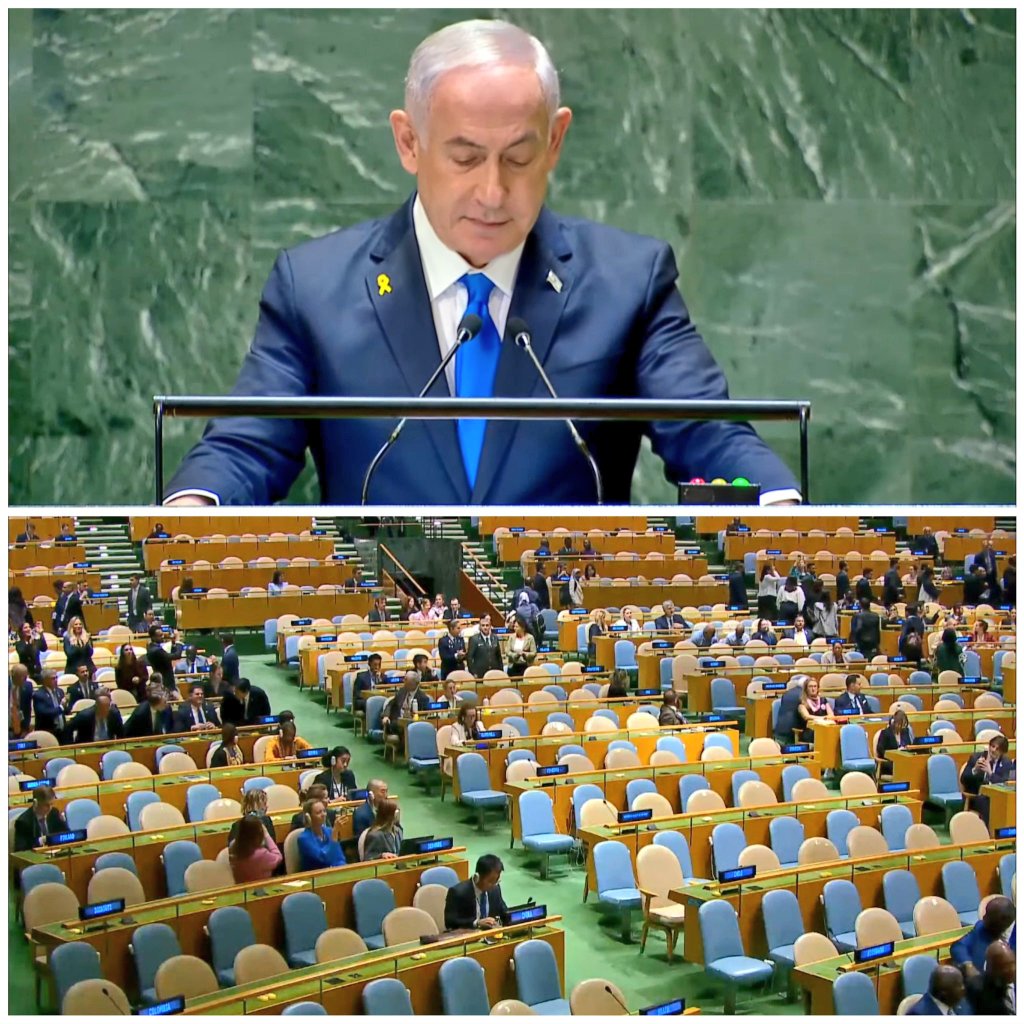New York City, September 26, 2024 — In a striking moment of protest, dozens of delegates from countries around the world staged a mass walkout during Israeli Prime Minister Benjamin Netanyahu’s speech at the United Nations General Assembly. The walkout, which involved representatives from Arab nations, African states, and some Latin American countries, was seen as a clear message of opposition to Israel’s policies toward the Palestinians.
Netanyahu, who was addressing the Assembly on Israel’s security concerns and the broader geopolitical landscape, did not acknowledge the walkout directly. As he spoke about Iran’s nuclear ambitions and the existential threats facing Israel, rows of diplomats silently rose from their seats and left the chamber. For many, the protest symbolized growing frustration with Israel’s settlement expansion and its military operations in the occupied Palestinian territories.
A Powerful Statement
The protest was led by representatives from several Arab nations, including Jordan, Egypt, and Lebanon, who have been vocally critical of Israel’s treatment of Palestinians. The walkout was also joined by delegates from countries that have long championed Palestinian rights, such as South Africa and Venezuela.
Following the walkout, Riyad Mansour, the Palestinian envoy to the UN, praised the action. “Today, the international community sent a clear message: The world will not remain silent while Israel continues to oppress and displace the Palestinian people,” he said. Mansour also accused Israel of violating international law through its settlement activities in the West Bank and the siege on Gaza.
Netanyahu’s Response
Netanyahu continued his speech despite the protest, focusing heavily on Iran, which he described as Israel’s greatest threat. He criticized the UN for what he called its “biased” treatment of Israel and accused the organization of turning a blind eye to the security challenges Israel faces from Hamas and Hezbollah.
“The truth may be uncomfortable for some,” Netanyahu said. “But no amount of walkouts or political stunts will change the reality on the ground. Israel will continue to defend itself, and we will not be deterred by empty gestures.”
Netanyahu’s office later issued a statement calling the walkout a “missed opportunity for dialogue,” adding that “those who chose to walk out today are rejecting peace and progress.”
Global Reactions
The walkout quickly became the focal point of the day’s events at the UN, sparking both support and criticism. Countries that took part in the walkout argued that Israel’s actions in the Palestinian territories left them no choice but to protest in such a manner. Several African and Latin American nations, which have historically supported Palestinian rights, echoed these sentiments.
However, not all nations agreed with the protest. The United States delegation, which remained in the chamber throughout Netanyahu’s address, expressed concern over the method of protest. A senior U.S. official noted that while the Biden administration disagrees with certain policies of the Israeli government, it believes engagement, not walkouts, is the way to move toward peace.
Ongoing Tensions
The walkout comes at a time when tensions between Israel and the Palestinians are at a high point, with increased violence in the West Bank and ongoing humanitarian concerns in Gaza. Human rights organizations have accused Israel of using excessive force and perpetuating policies of segregation and occupation, accusations that Israel denies.
For many observers, the walkout underscored the deepening diplomatic isolation Netanyahu faces on the global stage. The Israeli leader has increasingly found himself at odds with much of the international community over his government’s policies, particularly the expansion of Jewish settlements, which many countries consider illegal under international law.


Comments
Post a Comment